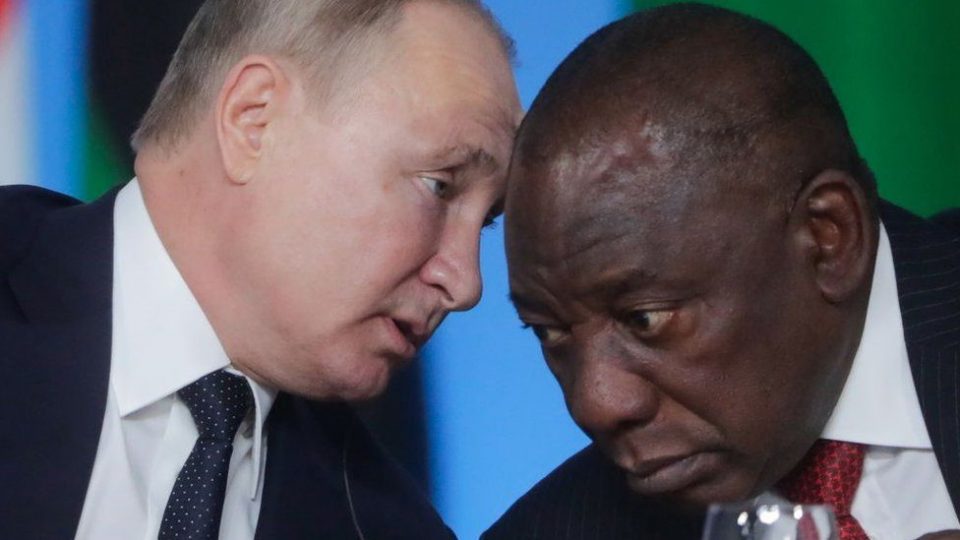Facing geopolitical devastation caused by the war in Ukraine, the African continent cannot be subordinate and obliged to choose one power over another. It must bring about an African foreign policy for a new multipolar world.
Those still in doubt just have to listen again to Vladimir Putin’s war-mongering speech on the eve of the invasion. The Russian president clearly calls for a reconfiguration of the post-Cold War international order, which would reduce the West’s grip on the world. The first country targeted by this repositioning strategy is the U.S., whose military presence Moscow intends to challenge in Europe, mainly in the East.
With a president who can stay in power until 2036, Moscow will constitute, for NATO, the major geo-strategic challenge of the coming years.
A new Cold War
Even though the match is far from being won for the master of the Kremlin, his military intervention will make Ukraine’s membership to the EU and NATO even more difficult. The outcome of the conflict will determine the type of political and military relations that Kyiv has with the Western powers.
While Putin might not receive formal guarantees that Ukraine will remain a neutral zone, the sole argument of state sovereignty — taking into account the rivalry and distrust between the big powers — also might not be enough to protect Ukrainian territory from Moscow’s annexation ambitions.
The principles of international rights will never drive Putin to loosen his grip on Ukraine.
Everything suggests that this Russian-Ukraine war will soon fall into the unenviable category of a “Cold War.” Because let us not fool ourselves: The principles of international rights and peace accords will never drive Putin to loosen his grip on Ukraine.
Therefore, it is time for Westerners to take the full measure of the projects on which the Kremlin’s foreign politics are based and its leader’s determination to carry them out. This ambition for power is not exclusive to Russia. But, in this case, it is coupled with a desire to impose a political counter-model based on a rereading of history.

Many African states chose to abstain during the vote on the UN resolution condemning Russia’s invasion
A continental strategy of diplomacy
In view of the power balance which takes shape between the West and Russia, Africa will have to adapt its strategy. Already, diplomatically, it seems to adopt a position of balance, even of non-alignment, which confirms its tendency towards neutrality.
This is what is shown by the massive abstention of African states during the vote on the UN resolution condemning the Russian intervention in Ukraine. By choosing not to choose, African countries, far from supporting the war, intend to preserve a depolarized foreign policy, interacting on multiple poles of power, whether they are Western, Russian or even Chinese.
This attitude can be explained by the continent’s extreme dependence on the surrounding environment, the fragility of bilateral relations — like those of Mali and of France — and the instability of the international system. But the current turmoil of our world, which is partly reflected in the war in Ukraine, calls for a profound rethinking of African diplomacy.
In fact, both politically and in the economic and military domains, Africa occupies a vulnerable position — the hegemonic struggles between the big powers are expressed there with more violence than elsewhere. And the debates in certain African countries show in reality a rivalry between Paris and Moscow, which will not be without consequence on the political future of African societies.
Power in a multipolar world
Due to geographical proximity, Europe cannot remain indifferent to the extension of Russian influence in Africa through the activities of a paramilitary society at the Kremlin’s service. The mistake, for the African governments, would consist of maintaining a logic of subordination obliging them to choose one power over another.
A real policy of sovereignty in terms of security and defense must be developed. And this passes through a reevaluation of existing tools at the levels of the African Union (African Peace and Security Architecture) and of Regional Economic Communities.
Outsourcing its security to foreign powers would be a strategic mistake
This will include, among other measures, tackling the political, economic and institutional obstacles that render Africa’s common policy of defense and security non-operational. In a world increasingly under turmoil, outsourcing its security to foreign powers would be a strategic mistake. Military cooperation must not take the form of geostrategic dependence.
The quest for sovereignty in this matter should be a part of a more global strategy relating to the idea of a foreign policy for the continent. A technical and specialized Commission should be put in place at the heart of the African Union to identify the susceptible levers and render them operational, in the long term, to bring about Africa as a power in a multipolar world.
*Amadou Sadjo Barry is a philosopher, researcher and professor at the Collège d’enseignement général et professionnel at Sainte-Hyacinthe in Quebec

